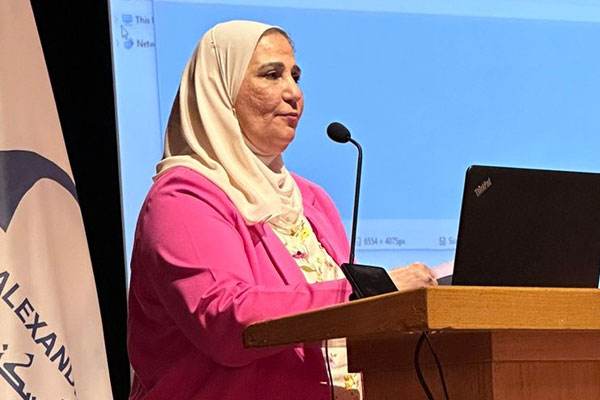Civil society constitutes one of the basic pillars for building the New Republic based on the principles of citizenship and effective partnership between all state institutions, the government, civil society and the private sector.
The role of civil society institutions is not limited to the service side only, as it helps productive families with projects carried out by the ministry, as well as serving people with disabilities and others.
These comments by Minister of Social Solidarity Nevine el-Qabbag came during the conference ‘Civil Society towards an effective partnership in the New Republic’ at the Bibliotheca Alexandrina last Tuesday.
The Ministry of Social Solidarity in co-operation with the Bibliotheca Alexandrina organised the event, which was opened by the minister in the presence of Governor of Alexandria Mohamed Al-Sharif, President of Alexandria University Abdel Aziz Qanswa and Bibliotheca Alexandrina Director Ahmed Zayed.
“Believing in the vital role of civil society and based on a wise political leadership, President Abdel Fattah El Sisi declared the year 2022 as the year of civil society. Today, civil society has become an essential partner in development,” the minister said.
“Civil society has a major role in responding to services, setting an example in the period of the Covid-19 pandemic, as it was a very great supporter of the state and also in the Sudanese crisis, as we witnessed the civil society struggling to provide services to those coming from Sudan, led by the Egyptian Red Crescent Society,” the minister added.
The minister referred to the new civil labour law, saying that the partnership of state and civil society after the application of the law has become more mature and confident, and is based on a set of advantages, rights and accountability as well.
Under the title ‘Innovative Solutions in Community Awareness Programmes’, Magdy Helmy, Awareness Programme Consultant, said the ministry’s awareness programme is aimed at forming positive values, attitudes and behaviours of family members and help them out of the cycle of multi-dimensional poverty and assist the state in sustainable development efforts and reject negative practices and trends.
Helmy added that the programme was launched to confront the most important societal issues that would affect development programmes. They were embodied in 12 issues including economic empowerment, emphasising the value of work, and that it is the way to improve the quality of life for families, linking empowerment opportunities with the ministry’s programmes, and the Awareness Programme of the issue of child labour and the interventions that it is carried out by the ministry to empower families with first care.
The Awareness Programme advisor added that the programme deals with the issue of population increase and an emphasis on spreading awareness of the importance of the family’s role in early detection of drugs, in addition to confronting the issues of circumcision and child marriage in addition to illegal immigration and the issue of citizenship.
Representatives of NGOs from the border governorates also talked about the most important problems facing the border community and the importance of the role of awareness, which must start with the family being made aware of the problems associated with early marriage and female genital mutilation (FGM), and knowing the twelve messages referred to by the ‘Awareness Programme’.






Discussion about this post